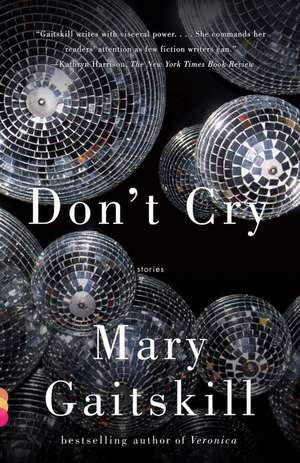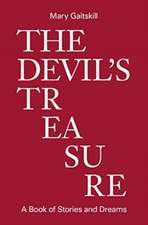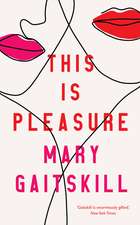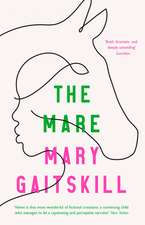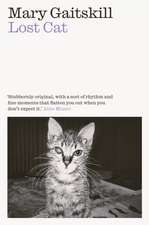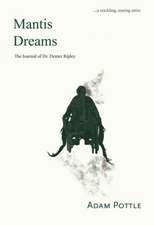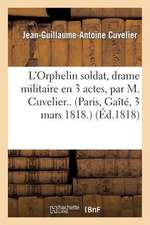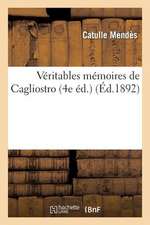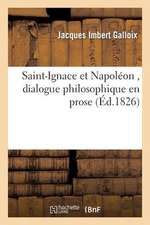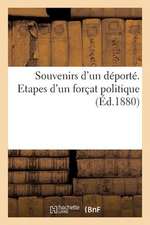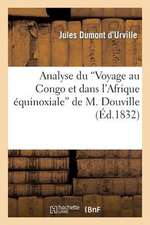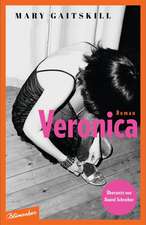Don't Cry
Autor Mary Gaitskillen Limba Engleză Paperback – 28 feb 2010
| Toate formatele și edițiile | Preț | Express |
|---|---|---|
| Paperback (2) | 47.99 lei 3-5 săpt. | +17.40 lei 4-10 zile |
| Profile – 10 noi 2021 | 47.99 lei 3-5 săpt. | +17.40 lei 4-10 zile |
| Vintage Books USA – 28 feb 2010 | 108.91 lei 3-5 săpt. |
Preț: 108.91 lei
Nou
Puncte Express: 163
Preț estimativ în valută:
20.84€ • 21.76$ • 17.21£
20.84€ • 21.76$ • 17.21£
Carte disponibilă
Livrare economică 25 martie-08 aprilie
Preluare comenzi: 021 569.72.76
Specificații
ISBN-13: 9780307275875
ISBN-10: 0307275876
Pagini: 226
Dimensiuni: 130 x 203 x 23 mm
Greutate: 0.28 kg
Editura: Vintage Books USA
ISBN-10: 0307275876
Pagini: 226
Dimensiuni: 130 x 203 x 23 mm
Greutate: 0.28 kg
Editura: Vintage Books USA
Notă biografică
Mary Gaitskill is also the author of Because They Wanted To (nominated for a PEN/Faulkner Award) and the novel Two Girls, Fat and Thin. Veronica was nominated for the National Book Award. Gaitskill is the recipient of a Guggenheim Fellowship, and her work has appeared in The New Yorker, Harper’s, Esquire, The Best American Short Stories, and The O. Henry Prize Stories. She lives in New York.
Extras
“Don't Cry”
Our first day in Addis Ababa we woke up to wedding music playing outside the hotel. We had traveled for 20 hours and we were deeply asleep. The music entered my sleep in the form of moving lights, like fireflies or animate laughter, in a pattern, but a loose and playful one. I was dreaming that I was with Thomas. In the dream, he was very young, and we were chasing a light that had come free of the others, running down a winding path with darkness all around.
When I woke at first I did not know where I was. The music seemed more real than the dingy room; its sound saturated me with happiness and pain. Then I saw Katya and remembered where we were and why. She was already up and standing at the window lifting a shade to peer out—the sun made a warm place on her skin and I felt affection for her known form in this unknown place. She turned and said, “Janice, there's weddings going on outside—plural!”
We went outside. All around our hotel were gardens, and in the gardens were crowds of people dressed in the bright colors of undiluted joy. Brides and grooms were wearing white satin, and the streets were lined with white limousines decked with flowers, and together with so much color, the white also seemed colorful. Little girls in red-and-white crinoline ran past, followed by a laughing woman. Everyone was laughing or smiling, and because I could not tell where the music came from, I had the sensation that it was coming directly from these smiling, laughing people. Katya turned to me and said, “Are we in heaven?”
I replied, “I don't know,” and for a second I meant it.
My husband Thomas had died six months before the trip to Addis Ababa. The music that woke me that first day touched my grief even before I knew it was wedding music. Even in my sleep I could hear love in it; even in my sleep, I could hear loss. I stepped out of the hotel in a state of grief, but when I saw the brides and grooms in their happiness, wonder slowly spread through my grief. It was like seeing my past and a future that was no longer mine but that I was part of anyway.
In the dirty hotel restaurant we had dry brick-like croissants and lots of good fruit—papaya, mangoes, bananas, oranges, and pineapple. The coffee was burnt, so we decided to go to the espresso place we'd been told was just a few blocks away. We never found the place, although we walked a long time. At first, we walked on a crowded street made of pavement, with department stores, an Internet café, and a grocery with a big Magic Marker drawing (green and red) of fruit and vegetables in the window. Starving wandered freely. The pavement abruptly fell off and gave way to rocks. We saw another wedding party, in a Mercedes decked with rich-colored flowers, moving through a herd of donkeys, the herders lagging behind, talking on their cells. Beggars swarmed around us, shouting and showing us their deformed limbs, their blind eyes. We forgot our espresso. The rocky street gave way to dirt with pools of muddy water. Houses, patched together with tin, plastic, canvas and wood, bulged out, sagged in, lurched and leaned this way, then that. Beggars swarmed us, chanting. Wedding guests in gold pants and silky shirts pushed their broken car through slowly parting pedestrians. A little boy marched along blowing a horn; he was followed by a smaller boy, who was shouting and rhythmically shaking a clutch of bells on a strap. The smell of fresh shit rose up suddenly and mixed with the odors of sweat and cooked meat. An old woman seated in the roots of a giant tree sold bundled sticks and dresses mounted on smiling white mannequins. Trees made soft, blunt, deep green shapes with their boughs. Katya turned to me, her face dazed. “We'd better go back,” she said. “We're getting lost.”
Katya was in Ethiopia to adopt a baby; I was there to help her. Katya asked me to go with her because I am one of her oldest friends, going back to our waitressing days in Manhattan. She is a narrow little woman with a broad, bossy air: ugly-beautiful, full lower lip a bit too pendulous, hips and breasts small but highly charged, black hair big, curly, and shining with secreted oil. The restaurant we worked in was run by Mafia thugs, and they would sometimes come in before the shift to do coke with us. The head thug really liked Katya; he would confide in her and ask her advice and she would console him and boss him around.
In those days I was putting myself through a writing program; she was having experiences. I got married and turned into an English professor who publishes stories in quarterly magazines. She started various businesses, which she either failed at or got bored with and sold. She had family money to begin with, and in spite of the failures along the way, she has actually amassed some money of her own. She now runs a boutique in D.C., which is where she lives. She has made some Ethiopian friends, one of whom, a woman named Meselu, runs a “big woman's” store across the street from Katya's business.
Katya had been thinking of adoption for some time; she didn't want to go through an agency in America because it pissed her off that while agencies give the birth mother full disclosure regarding the adoptive parent, there is no reciprocity. She didn't want to go through a foreign agency because most of them require a two-year wait, and she felt that, at forty-nine, she was already too old. She learned through someone on the Internet—a woman in California who'd already adopted an Ethiopian child—that independent adoptions there were relatively easy. It helped, of course, that Meselu could hook her up with people in Addis Ababa, including a driver named Yonas, who specialized in clients there to adopt.
When Katya asked me if I would go to Africa with her, I said yes, because Thomas had died four months earlier and I had still not gone back to teaching. In the emptiness of my life, it didn't seem to matter what I did; between doing nothing and doing something, it seemed better to do something. Thomas and I had never had children, and, maybe without thinking about it, I wanted to help my friend give a child safe passage. Katya had never been lucky with men and I knew she had always envied my marriage; perhaps I was hoping to balance my loss with something good for her. In any case, before I left I took Thomas' wedding ring from the altar I had made in our bedroom, took my own ring from my finger, and put them both on a gold chain around my neck.
When Yonas came to pick us up at the hotel, he told us that every Saturday in May people in Addis Ababa come out to get married, and that our hotel was an especially popular spot because of the gardens. Yonas was a young man with a beautiful face and a profound feeling of age about him. When we told him how heavenly the weddings had seemed to us, he gravely bobbed his head and made the quick, sharp inhalation that we were beginning to understand as 'yes.' He held the door of his rattling Soviet car for us and said something I couldn't understand. We got in, sank into the broken, reeking cushions, down almost to the floor.
We couldn't go to the orphanage on a Saturday, so Yonas took us up into the mountains, a trip I remember in the way I remember my dream that morning. I remember getting out of the car to stand at the top of a steep street, with big, broken stones on each side of us, and looking down at a jumble of shanties and tiny houses careering up and down a hill. Further out of the city we saw houses made of mud and gray thatch that appeared soft as hair from a distance; there was one house surrounded by a beautiful fence made of light, slender branches of all shapes and sizes linked in a winding, nearly musical pattern, varied by the curves of certain branches that suddenly and softly digressed before returning to the music of the pattern. Big flowers grew through the branches in random places, spilling their pink petals. There was a woman in the yard with a bright red scarf on her head. The sky was full of soft, swollen clouds.
That night we had dinner with Meselu's relatives. We were taken to the house by Meselu's uncle who spoke a little English; we brought huge bundles of clothes, batteries, and toiletries that Meselu had sent. The house was behind a high stone wall with an archway bowered with thick-growing plants.
The head of the family was a matriarch named Zeyneb, who served us a spread with dozens of little meat dishes—goat, beef and lamb in a variety of sauces with a grain called teff. Zeyneb sat at the head of the table in a crimson dress and passed the dishes in a formal manner. Most of her family was there—one of her two daughters, three of her four sons, and six grandchildren. The uncle translated as well as his skill would allow. We couldn't understand a lot of it; we heard something about the election and the government. Zeyneb said something about adoption and things being different than they had been. The grandchildren talked loudly and happily among themselves, listening sideways to the translations of our speech. Zeyneb asked how many children I had. When I said none, one of the little girls looked at me piercingly.
That night we went to bed early—we had to. The power was out and it got too dark to read by 8:30. We lay in the dark and talked for a long time. We talked about the jumbled streets, Zeyneb, the mountains, and the fence—which, we agreed, would cost thousands of dollars in the States. It was almost cold, and so we slept with the windows shut; the muffled street sound had a lulling effect. Katya said she was too excited to sleep, but she drifted off quickly; it was I who stirred all night, unable to sleep or to stay fully awake. The wedding music from the morning crowded my mind, the bright colors and smiles, the running girls, the laughing woman. Cars mingled with donkeys; a little boy blew a horn. Beggars came bursting out of the wedding crowd, shouting. One of them was a boy I had seen that morning, and tried not to notice, a boy with a gouged-out eye socket. We emptied our purses—I gave the gouged boy handfuls of coins—but it was not enough.
I touched the wedding rings around my neck; Thomas appeared to me and sat on the bed. I stretched out my hand to him; the street crowd vanished. I remembered Thomas inside me. Once I said “I want you inside me all the time,” and he answered “I will be.” Children peered around a dark corner—first they were Zeyneb's grandchildren, then they were unborn children waiting for Thomas and me to conceive them. Among them was the boy with the gouged eye, not begging but waiting to be born. “I want you now,” I whispered. Thomas replied, “I am here,” but faintly. Chanting sounded. It was haunting, stern, implacable as a machine made of powerful feelings cut away from their source. Rules, I thought. Punishment: it's coming. Chanting filled the suffocating room. “Shut up!” I hissed, “Just shut the fuck up!”
Katya stirred and murmured “What?”
“This noise, what is it?”
“Zeyneb said it's from the churches. Go back to sleep, it's going to go on all day.”
From the Hardcover edition.
Our first day in Addis Ababa we woke up to wedding music playing outside the hotel. We had traveled for 20 hours and we were deeply asleep. The music entered my sleep in the form of moving lights, like fireflies or animate laughter, in a pattern, but a loose and playful one. I was dreaming that I was with Thomas. In the dream, he was very young, and we were chasing a light that had come free of the others, running down a winding path with darkness all around.
When I woke at first I did not know where I was. The music seemed more real than the dingy room; its sound saturated me with happiness and pain. Then I saw Katya and remembered where we were and why. She was already up and standing at the window lifting a shade to peer out—the sun made a warm place on her skin and I felt affection for her known form in this unknown place. She turned and said, “Janice, there's weddings going on outside—plural!”
We went outside. All around our hotel were gardens, and in the gardens were crowds of people dressed in the bright colors of undiluted joy. Brides and grooms were wearing white satin, and the streets were lined with white limousines decked with flowers, and together with so much color, the white also seemed colorful. Little girls in red-and-white crinoline ran past, followed by a laughing woman. Everyone was laughing or smiling, and because I could not tell where the music came from, I had the sensation that it was coming directly from these smiling, laughing people. Katya turned to me and said, “Are we in heaven?”
I replied, “I don't know,” and for a second I meant it.
My husband Thomas had died six months before the trip to Addis Ababa. The music that woke me that first day touched my grief even before I knew it was wedding music. Even in my sleep I could hear love in it; even in my sleep, I could hear loss. I stepped out of the hotel in a state of grief, but when I saw the brides and grooms in their happiness, wonder slowly spread through my grief. It was like seeing my past and a future that was no longer mine but that I was part of anyway.
In the dirty hotel restaurant we had dry brick-like croissants and lots of good fruit—papaya, mangoes, bananas, oranges, and pineapple. The coffee was burnt, so we decided to go to the espresso place we'd been told was just a few blocks away. We never found the place, although we walked a long time. At first, we walked on a crowded street made of pavement, with department stores, an Internet café, and a grocery with a big Magic Marker drawing (green and red) of fruit and vegetables in the window. Starving wandered freely. The pavement abruptly fell off and gave way to rocks. We saw another wedding party, in a Mercedes decked with rich-colored flowers, moving through a herd of donkeys, the herders lagging behind, talking on their cells. Beggars swarmed around us, shouting and showing us their deformed limbs, their blind eyes. We forgot our espresso. The rocky street gave way to dirt with pools of muddy water. Houses, patched together with tin, plastic, canvas and wood, bulged out, sagged in, lurched and leaned this way, then that. Beggars swarmed us, chanting. Wedding guests in gold pants and silky shirts pushed their broken car through slowly parting pedestrians. A little boy marched along blowing a horn; he was followed by a smaller boy, who was shouting and rhythmically shaking a clutch of bells on a strap. The smell of fresh shit rose up suddenly and mixed with the odors of sweat and cooked meat. An old woman seated in the roots of a giant tree sold bundled sticks and dresses mounted on smiling white mannequins. Trees made soft, blunt, deep green shapes with their boughs. Katya turned to me, her face dazed. “We'd better go back,” she said. “We're getting lost.”
Katya was in Ethiopia to adopt a baby; I was there to help her. Katya asked me to go with her because I am one of her oldest friends, going back to our waitressing days in Manhattan. She is a narrow little woman with a broad, bossy air: ugly-beautiful, full lower lip a bit too pendulous, hips and breasts small but highly charged, black hair big, curly, and shining with secreted oil. The restaurant we worked in was run by Mafia thugs, and they would sometimes come in before the shift to do coke with us. The head thug really liked Katya; he would confide in her and ask her advice and she would console him and boss him around.
In those days I was putting myself through a writing program; she was having experiences. I got married and turned into an English professor who publishes stories in quarterly magazines. She started various businesses, which she either failed at or got bored with and sold. She had family money to begin with, and in spite of the failures along the way, she has actually amassed some money of her own. She now runs a boutique in D.C., which is where she lives. She has made some Ethiopian friends, one of whom, a woman named Meselu, runs a “big woman's” store across the street from Katya's business.
Katya had been thinking of adoption for some time; she didn't want to go through an agency in America because it pissed her off that while agencies give the birth mother full disclosure regarding the adoptive parent, there is no reciprocity. She didn't want to go through a foreign agency because most of them require a two-year wait, and she felt that, at forty-nine, she was already too old. She learned through someone on the Internet—a woman in California who'd already adopted an Ethiopian child—that independent adoptions there were relatively easy. It helped, of course, that Meselu could hook her up with people in Addis Ababa, including a driver named Yonas, who specialized in clients there to adopt.
When Katya asked me if I would go to Africa with her, I said yes, because Thomas had died four months earlier and I had still not gone back to teaching. In the emptiness of my life, it didn't seem to matter what I did; between doing nothing and doing something, it seemed better to do something. Thomas and I had never had children, and, maybe without thinking about it, I wanted to help my friend give a child safe passage. Katya had never been lucky with men and I knew she had always envied my marriage; perhaps I was hoping to balance my loss with something good for her. In any case, before I left I took Thomas' wedding ring from the altar I had made in our bedroom, took my own ring from my finger, and put them both on a gold chain around my neck.
When Yonas came to pick us up at the hotel, he told us that every Saturday in May people in Addis Ababa come out to get married, and that our hotel was an especially popular spot because of the gardens. Yonas was a young man with a beautiful face and a profound feeling of age about him. When we told him how heavenly the weddings had seemed to us, he gravely bobbed his head and made the quick, sharp inhalation that we were beginning to understand as 'yes.' He held the door of his rattling Soviet car for us and said something I couldn't understand. We got in, sank into the broken, reeking cushions, down almost to the floor.
We couldn't go to the orphanage on a Saturday, so Yonas took us up into the mountains, a trip I remember in the way I remember my dream that morning. I remember getting out of the car to stand at the top of a steep street, with big, broken stones on each side of us, and looking down at a jumble of shanties and tiny houses careering up and down a hill. Further out of the city we saw houses made of mud and gray thatch that appeared soft as hair from a distance; there was one house surrounded by a beautiful fence made of light, slender branches of all shapes and sizes linked in a winding, nearly musical pattern, varied by the curves of certain branches that suddenly and softly digressed before returning to the music of the pattern. Big flowers grew through the branches in random places, spilling their pink petals. There was a woman in the yard with a bright red scarf on her head. The sky was full of soft, swollen clouds.
That night we had dinner with Meselu's relatives. We were taken to the house by Meselu's uncle who spoke a little English; we brought huge bundles of clothes, batteries, and toiletries that Meselu had sent. The house was behind a high stone wall with an archway bowered with thick-growing plants.
The head of the family was a matriarch named Zeyneb, who served us a spread with dozens of little meat dishes—goat, beef and lamb in a variety of sauces with a grain called teff. Zeyneb sat at the head of the table in a crimson dress and passed the dishes in a formal manner. Most of her family was there—one of her two daughters, three of her four sons, and six grandchildren. The uncle translated as well as his skill would allow. We couldn't understand a lot of it; we heard something about the election and the government. Zeyneb said something about adoption and things being different than they had been. The grandchildren talked loudly and happily among themselves, listening sideways to the translations of our speech. Zeyneb asked how many children I had. When I said none, one of the little girls looked at me piercingly.
That night we went to bed early—we had to. The power was out and it got too dark to read by 8:30. We lay in the dark and talked for a long time. We talked about the jumbled streets, Zeyneb, the mountains, and the fence—which, we agreed, would cost thousands of dollars in the States. It was almost cold, and so we slept with the windows shut; the muffled street sound had a lulling effect. Katya said she was too excited to sleep, but she drifted off quickly; it was I who stirred all night, unable to sleep or to stay fully awake. The wedding music from the morning crowded my mind, the bright colors and smiles, the running girls, the laughing woman. Cars mingled with donkeys; a little boy blew a horn. Beggars came bursting out of the wedding crowd, shouting. One of them was a boy I had seen that morning, and tried not to notice, a boy with a gouged-out eye socket. We emptied our purses—I gave the gouged boy handfuls of coins—but it was not enough.
I touched the wedding rings around my neck; Thomas appeared to me and sat on the bed. I stretched out my hand to him; the street crowd vanished. I remembered Thomas inside me. Once I said “I want you inside me all the time,” and he answered “I will be.” Children peered around a dark corner—first they were Zeyneb's grandchildren, then they were unborn children waiting for Thomas and me to conceive them. Among them was the boy with the gouged eye, not begging but waiting to be born. “I want you now,” I whispered. Thomas replied, “I am here,” but faintly. Chanting sounded. It was haunting, stern, implacable as a machine made of powerful feelings cut away from their source. Rules, I thought. Punishment: it's coming. Chanting filled the suffocating room. “Shut up!” I hissed, “Just shut the fuck up!”
Katya stirred and murmured “What?”
“This noise, what is it?”
“Zeyneb said it's from the churches. Go back to sleep, it's going to go on all day.”
From the Hardcover edition.
Recenzii
A New York Times Notable Books
“A mindsearing, soul-rattling, gratitude-inducing collection.”
—O, The Oprah Magazine
“Gaitskill writes with visceral power. . . . She commands her readers’ attention as few fiction writers can.”
—Kathryn Harrison, The New York Times Book Review
“Masterful. . . . Past, present, future; heartbreak, desire, and loss—none of it is quite beyond her. Gaitskill’s prose glides lightly over unsoundable depths.”
—The Village Voice
“Exquisite. . . . Gaitskill never stops at surfaces. . . . She believes—maybe reluctantly—in the absolute primacy of human connections, no matter what mess we tend to make of them.”
—The Chicago Tribune
“Intense and thought-provoking, compelling and often tragic, yet filled with a subtle magic. . . . Gaitskill explores the spectrum of emotion: lust, greed, sorrow, hope, anger and many forms of love.”
—Los Angeles Times
“Gaitskill is a fiercely emphatic writer—her concern always how close we can get to the pith of a protagonist or relationship—and Don’t Cry is wonderfully Machiavellian in its excavation of character.”
—San Francisco Chronicle
“Evocative yet efficient descriptions that remind you why you read in the first place. . . . Gaitskill never loses sight of her ambition to claim her readers’ hearts. . . . With unpretentious yet heartbreaking lines. . . . Gaitskill owns you, and earns the right to put you through the ringer of vulgarity.”
—Newsweek
“Gaitskill’s short stories, with remarkably little prologue, routinely go far down and in deep. . . . She is, to be sure, one of the great living American fiction writers.”
—The Buffalo News
“Gaitskill seems to have traveled through a lifetime of perception, moving in a progression from raw and violently sexualized to tender and regretful, with every character knowing the intimacy and exhaustion of sorrow.”
—The Boston Globe
“Mary Gaitskill understands people. She doesn’t patronize and she doesn’t condemn. She simply focuses her insight into their characters, with rock-hard sympathy and beautiful prose.”
—The Sunday Oregonian
“If Don’t Cry finds Gaitskill older and wiser, it proves she’s lost none of the honesty and inventiveness. On the contrary, maturity suits her well.”
—South Florida Sun-Sentinel
“Savagely intelligent tales. . . . Gaitskill has consistently plumbed the farther reaches of psychic extremis with power and passion.”
—Elle
“Gaitskill continues to deliver sharply defined visions of everyday lives that also manage to hum with a mysterious subconscious feedback.”
—Time Out New York
“A deeply compassionate book. . . . Brave and even majestic. . . . In adult life we put things safely in categories. Gaitskill doesn’t; won’t. This is her project throughout the book: to remind us that people’s experience ought not to be gainsaid. Experience ought to be explored and revealed. Physically, emotionally, and spiritually.”
—Slate
“For all of Gaitskill’s rough perspective on the world, she doesn’t shield her heart from view. . . . [There’s] a thread of poignancy and real warmth that keeps her work from becoming inaccessible.”
—The Miami Herald
“Gaitskill knows how to pull open the trap door beneath the reader’s feet, so that we drop from clever, supercilious dialogue and elegant description to something deeper. . . . She finds words for intimacy at its most inarticulate, in stories that jolt, seduce and disturb.”
—The Globe and Mail (Toronto)
“Gaitskill’s characters have never listened very well, and these stories are strewn with the wreckage of lost opportunities and broken lives that result invariably. [But] Don’t Cry moves beyond showing us the spilled milk to ask why it’s on the floor—and whether, next time, things might be different.”
—The Milwaukee Journal-Sentinel
“A gathering of fiercely observed portraits of cultural unease, from the Reagan years to the early days of the Iraq War.” —Vogue
“Gaitskill’s m.o. is to follow her creations wherever they go—to places she didn’t anticipate and may not full understand. She’s ravenous for complexity.”
—Bloomberg News
“Gaitskill takes up themes of yearning, grief and emotional vulnerability that will be familiar to her readers, but, this time, she imagines a broader landscape, rife with political turmoil. Gaitskill’s emotional landscape is broader, too, and delicately nuanced. . . . Trust and shelter, recognition of one soul by another: In Gaitskill’s world, these gifts—fragile, ephemeral, hard won—count as happiness.”
—The San Diego Union-Tribune
“Don’t Cry takes its place among artworks of great moral seriousness.”
—BOMB Magazine
“Gaitskill is no coward. Comfort is more or less beyond the question here. Yet possibility lurks in every interstice. . . . Once again she plays with time, sliding past and present onto the same string like the beads of a darkly gorgeous necklace.”
—The Cleveland Plain Dealer
“A mindsearing, soul-rattling, gratitude-inducing collection.”
—O, The Oprah Magazine
“Gaitskill writes with visceral power. . . . She commands her readers’ attention as few fiction writers can.”
—Kathryn Harrison, The New York Times Book Review
“Masterful. . . . Past, present, future; heartbreak, desire, and loss—none of it is quite beyond her. Gaitskill’s prose glides lightly over unsoundable depths.”
—The Village Voice
“Exquisite. . . . Gaitskill never stops at surfaces. . . . She believes—maybe reluctantly—in the absolute primacy of human connections, no matter what mess we tend to make of them.”
—The Chicago Tribune
“Intense and thought-provoking, compelling and often tragic, yet filled with a subtle magic. . . . Gaitskill explores the spectrum of emotion: lust, greed, sorrow, hope, anger and many forms of love.”
—Los Angeles Times
“Gaitskill is a fiercely emphatic writer—her concern always how close we can get to the pith of a protagonist or relationship—and Don’t Cry is wonderfully Machiavellian in its excavation of character.”
—San Francisco Chronicle
“Evocative yet efficient descriptions that remind you why you read in the first place. . . . Gaitskill never loses sight of her ambition to claim her readers’ hearts. . . . With unpretentious yet heartbreaking lines. . . . Gaitskill owns you, and earns the right to put you through the ringer of vulgarity.”
—Newsweek
“Gaitskill’s short stories, with remarkably little prologue, routinely go far down and in deep. . . . She is, to be sure, one of the great living American fiction writers.”
—The Buffalo News
“Gaitskill seems to have traveled through a lifetime of perception, moving in a progression from raw and violently sexualized to tender and regretful, with every character knowing the intimacy and exhaustion of sorrow.”
—The Boston Globe
“Mary Gaitskill understands people. She doesn’t patronize and she doesn’t condemn. She simply focuses her insight into their characters, with rock-hard sympathy and beautiful prose.”
—The Sunday Oregonian
“If Don’t Cry finds Gaitskill older and wiser, it proves she’s lost none of the honesty and inventiveness. On the contrary, maturity suits her well.”
—South Florida Sun-Sentinel
“Savagely intelligent tales. . . . Gaitskill has consistently plumbed the farther reaches of psychic extremis with power and passion.”
—Elle
“Gaitskill continues to deliver sharply defined visions of everyday lives that also manage to hum with a mysterious subconscious feedback.”
—Time Out New York
“A deeply compassionate book. . . . Brave and even majestic. . . . In adult life we put things safely in categories. Gaitskill doesn’t; won’t. This is her project throughout the book: to remind us that people’s experience ought not to be gainsaid. Experience ought to be explored and revealed. Physically, emotionally, and spiritually.”
—Slate
“For all of Gaitskill’s rough perspective on the world, she doesn’t shield her heart from view. . . . [There’s] a thread of poignancy and real warmth that keeps her work from becoming inaccessible.”
—The Miami Herald
“Gaitskill knows how to pull open the trap door beneath the reader’s feet, so that we drop from clever, supercilious dialogue and elegant description to something deeper. . . . She finds words for intimacy at its most inarticulate, in stories that jolt, seduce and disturb.”
—The Globe and Mail (Toronto)
“Gaitskill’s characters have never listened very well, and these stories are strewn with the wreckage of lost opportunities and broken lives that result invariably. [But] Don’t Cry moves beyond showing us the spilled milk to ask why it’s on the floor—and whether, next time, things might be different.”
—The Milwaukee Journal-Sentinel
“A gathering of fiercely observed portraits of cultural unease, from the Reagan years to the early days of the Iraq War.” —Vogue
“Gaitskill’s m.o. is to follow her creations wherever they go—to places she didn’t anticipate and may not full understand. She’s ravenous for complexity.”
—Bloomberg News
“Gaitskill takes up themes of yearning, grief and emotional vulnerability that will be familiar to her readers, but, this time, she imagines a broader landscape, rife with political turmoil. Gaitskill’s emotional landscape is broader, too, and delicately nuanced. . . . Trust and shelter, recognition of one soul by another: In Gaitskill’s world, these gifts—fragile, ephemeral, hard won—count as happiness.”
—The San Diego Union-Tribune
“Don’t Cry takes its place among artworks of great moral seriousness.”
—BOMB Magazine
“Gaitskill is no coward. Comfort is more or less beyond the question here. Yet possibility lurks in every interstice. . . . Once again she plays with time, sliding past and present onto the same string like the beads of a darkly gorgeous necklace.”
—The Cleveland Plain Dealer
Descriere
Descriere de la o altă ediție sau format:
A collection of provocative, searching short stories by Mary Gaitskill, acclaimed author of Bad Behavior and This is Pleasure.
A collection of provocative, searching short stories by Mary Gaitskill, acclaimed author of Bad Behavior and This is Pleasure.
